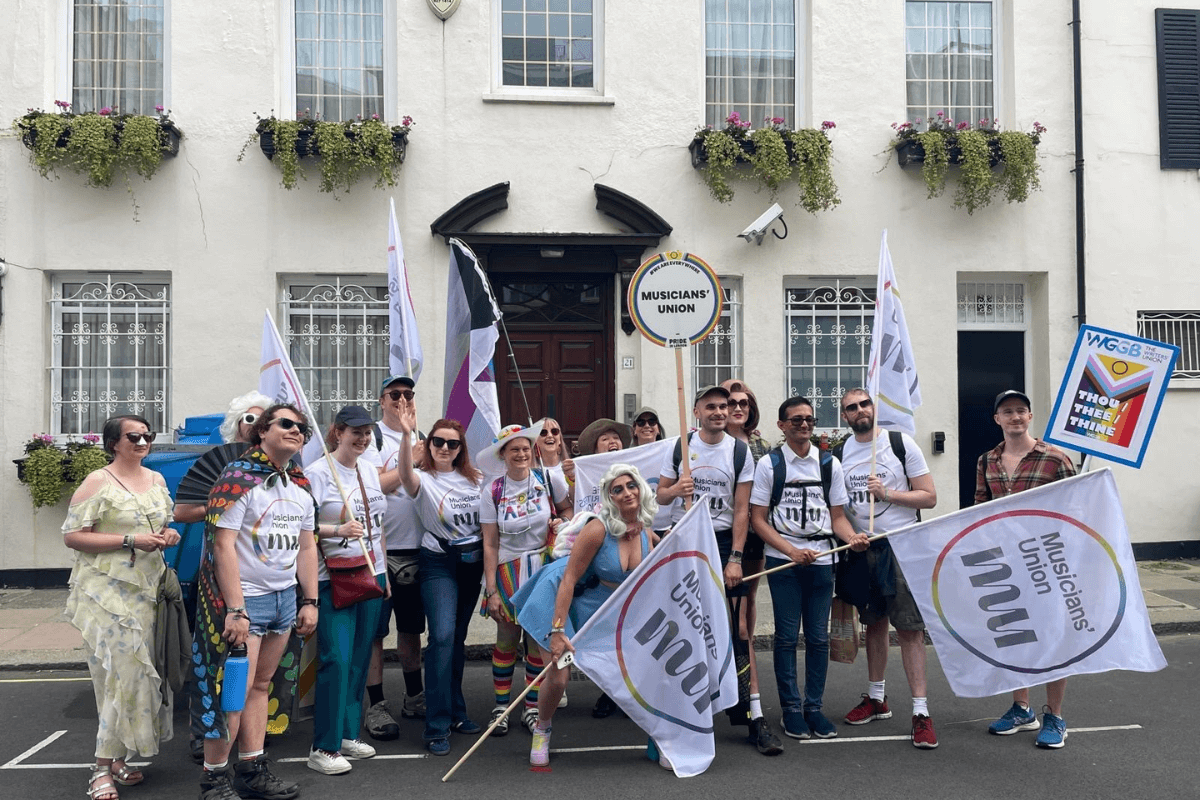MU members Katie Manasse, Steven Crichlow and Joshua Guy, along with MU Head of Equality, Diversity & Inclusion John Shortell and London Regional Officer Simeon Scheuber-Rush. Image credit: The MU.
MU members Katie Manasse, Steven Crichlow and Joshua Guy attended the TUC LGBT+ Conference 2024 in June to address the unique challenges faced by LGBT+ musicians.
LGBT+ musicians face disproportionately high levels of discrimination
The MU motion, drafted by the Equality, Diversity & Inclusion Committee, focused on the findings of the Musicians’ Census 2023 LGBTQ+ Musicians Insight report that revealed LGBT+ musicians face high levels of discrimination with trans musicians being disproportionately impacted.
The research revealed that:
- Almost a quarter of trans musicians said they are not out at work
- Over half reported experiencing discrimination based on their gender identity but only a third reported it
- 43% of LGBT+ musicians reported low mental wellbeing
- 90% of those who reported low mental wellbeing also reported experiencing or witnessing discrimination.
The MU’s motion called on the TUC to challenge transphobia and promote equal rights for all freelance workers
The motion called on the TUC to:
- Continue to tackle the root causes of transphobia
- Challenge anti-trans rhetoric and promote authentic, positive perceptions of trans people
- Lobby for funding for culturally relevant mental health services for LGBTQ+ people
- Support affiliates to stand their ground in the face of anti-trans backlash
- Lobby government to extend the protections in the Equality Act 2010 to all freelance workers.
We have to hide parts of ourselves for fear of losing work and respect
Moving the motion, MU Executive Committee member Katie Manasse said:
“Working in music involves high rates of freelance working, late nights, drug and alcohol cultures, working in spaces with heightened emotions, and a long history of imbalances of power and risk of losing work for undefined reasons.
Far too many musicians feel they have to hide any characteristics that are perceived weaknesses, and risk their being booked again.
“Far too many musicians feel they have to hide any characteristics that are perceived weaknesses, and risk their being booked again.
The overwhelming experience of many in the music industry is still that we have to hide parts of ourselves for fear of losing work and respect, whilst simultaneously wearing our hearts on our sleeves to provide entertainment and art.”
The motion was seconded by NUJ and passed with unanimous support.
Queer voices in our media is how we find our language
MU member Joshua Guy, who was a first-time delegate at the conference, spoke in support of NUJ’s motion which tackled the decline of LGBTQ+ media.
Now is the time to protect our jobs in media. Now is the time to ensure that our stories are shared. Now is the time to support this motion.
Joshua said “Music and media go hand in hand, and in the music industry, we see the positive impact towards racial diversity from organisations such as Black Lives in Music and the Chineke! Foundation.
“One of the many positive impacts is that our youngest Black and Brown musicians see that there is a place and jobs at the Classical music table for them.
“Queer voices in our media is how we find our language, it’s how we communicate our ideas and it’s how we find each other.
“There is more media and news representation than ever, with young people having access to a breadth of information, stories and truths that I could only of dreamed of when I was teenager.
“Now is the time to protect our jobs in media. Now is the time to ensure that our stories are shared. Now is the time to support this motion.”
The NUJ motion also passed unanimously.
MU members marched at London Pride in solidarity with LGBT+ musicians
The weekend after TUC LGBT+ Conference, MU members attended Pride in London and marched with other Trade Unions, charities and businesses celebrating LGBT+ people and calling for equality for all.
